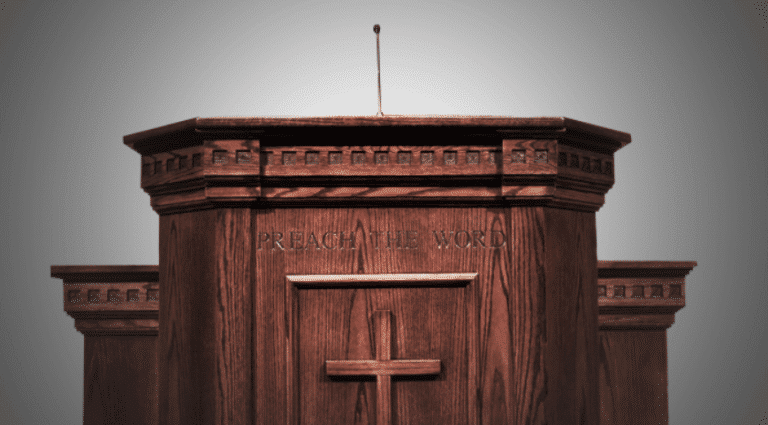Where have all the pulpits gone? It is not uncommon today to visit a church and see a man standing on the sanctuary’s floor speaking to the congregation with no pulpit in sight. Perhaps he uses a music stand or sits at a small round table if he uses anything at all. Often, the idea is that this closeness to the congregation, or less traditional feel and a more casual style, is more engaging, less intimidating, and feels more like a conversation than preaching. The pulpit, or lack thereof, is always an intentional choice—always meant to communicate something. But is that what we should be aiming for? Should the congregation feel like the preacher is having a conversation with them? Should the Word preached be something that seems more casual? The real question is, what does the pulpit say that would make one remove it?
The very fact that there is a conversation about whether or not to use a pulpit demonstrates that the pulpit does indeed speak. The pulpit has something to say, but what? To answer this vital question, a little tour of history is helpful. First, the word itself, pulpit, comes from a Latin term meaning “scaffold” or “platform.”
The pulpit is not a new invention, though style and placement have changed over time. The first recorded mention of the pulpit is from around AD 250 from Cyprian. But before that, there certainly were platforms from which men would speak, indicating that something worth hearing was being said. The Greek bema was used in ancient times in Athens, and in the synagogues, it was used for Torah reading. So, the concept is nothing new.
From Cyprian into the 400s, one would find the pulpit in church construction. But then something interesting happened, and it happened because the pulpit speaks; in other words, it represents something. In the medieval era, the pulpit was pushed to the side by the catholic church to make mass prominent. Why is this such an issue? This is where we answer the question, “How does the pulpit speak?” The pulpit speaks in that it represents the very word of God. This is where the word of God is heralded, explained, and brought to bear on the lives and hearts of the people of God. The pulpit is really a metonym for God’s word, much like the crown is for a king. And this is why it is so vital. What happened in the medieval era is that God’s Word was set to the side, viewed as less important than the mass. When the Word of God becomes less important than other things in the church, the pulpit often disappears.
Faithful men, both past and present, have understood that the pulpit speaks. For Martyn Lloyd-Jones, the pulpit was the place where the Gospel was to be heralded and the Scriptures explained. It represented the Word of God brought to the people of God. J. C. Ryle, a stalwart defender of the faith, spoke of what happened in the pulpit as that which impacted the entire church, saying, “If you want to warm a church, put a stove in the pulpit.” John MacArthur, one of today’s most faithful preachers, repeatedly speaks of the need to guard the pulpit, and in his book, Parable: Mysteries of God’s Kingdom Revealed through the Stories Jesus Told, he addresses the problem in many churches today, and the absence of the pulpit saying, “In some cases, the pulpit is totally gone, replaced by a stage and a screen.” Faithful preachers understand that the pulpit speaks.
We live in a day and age where conversations, counseling sessions, skits, sermonettes, and entertainment are valued over the preaching of God’s Word. If not that, then the idea of not being above the people or wanting to connect more deeply with the people is the reason for the removal of the pulpit. But then one must ask, is the Word of God not an authority above the people? Is it more connection to the preacher that the church needs, or is it the Word of God that the church needs? Does the congregation need a conversation with the preacher, or do they need to hear from Heaven through His Word? Do God’s people need to feel entertained, or do they need God’s truth brought to bear on their lives? Of course, the rhetorical nature of these questions makes the answers clear.
The reformers understood the symbolism behind moving the pulpit, and they understood what it meant to move it back to the center of the church above the people. Luther, the man who nailed the 95 theses to the Wittenburg Castle church, said this concerning the pulpit, “The pulpit is the throne for the Word of God.” Charles Spurgeon also understood that which the pulpit represents, saying, “If there be a place under heaven more holy than another, it is the pulpit whence the gospel is preached.” The pulpit speaks because it represents the heralded Word of God. The Bible is no mere book, and its words are not the words of a mere mortal. No! They are the very words of Almighty God. They are the King’s words, and they are indeed above us. They alone guide us into all truth, direct us to paths of righteousness, pierce our hearts, renew our minds, and convict us of our sins and deep dependency upon almighty God and the atoning death of Christ.
The pulpit in the church says many things. It says, “This church is ruled by the word of God.” It says, “These people are beneath the Word of God as sheep being led by the great Shepherd.” The pulpit speaks, crying aloud for all with ears to hear, saying, “Listen! Listen! From me comes the great words of the King as preached from the King’s book.” The pulpit speaks, pleading with the hearer to look up, not to a preacher, but to the words preached that come from the one who is worthy to be looked up to, the Sovereign King of the universe. The pulpit shouts out loud, “Look, listen, and obey, and receive life from this Gospel preached here.” This is what the pulpit speaks. And when it is removed, its voice is silenced. The communication, no matter how sincere, is always something less, something lower, something less powerful. The church doesn’t need to hear from a man standing on the same level as them, having a conversation with interaction; the church needs to hear from almighty God. Let’s bring back the pulpit, and with a right understanding for that which it is meant to represent, the Word of God, rightly taking its place over the lives of all who call Christ “Lord.”
Bring back the pulpit!




